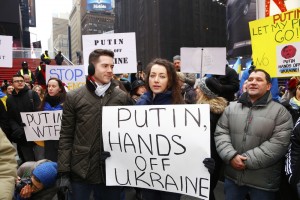World News
Cameron: Russia needs to change stance on Ukraine or face isolation

EuroMaidan, a Ukrainian-based pro-western movement, sponsored a rally & march to the Russian consulate to protest Moscow’s intervention in the Ukraine. Times Square. a katz / Shutterstock
BRUSSELS — Leaders of the Group of Seven (G7) most industrialized nations must sent a clear message to Russian President Vladimir Putin that Russia faces further international isolation if Moscow continues meddling with Ukraine’s domestic affairs, British Prime Minister David Cameron said.
“The G7 should send a clear message of support to Ukraine and a united message to President Putin that he needs to engage with the Ukrainian government to find a diplomatic solution to the crisis,” Cameron said after the first day of the G7 summit in Brussels.
The British premier is expected to meet with Putin this week in French Normandy, where they along with other world leaders were invited by President Francois Hollande for the D-Day celebrations.
“That’s what I’ll be saying to President Putin myself tomorrow,” Cameron told journalists. “This is the first summit without Russia since the 1990s. And until they change course, they need to understand that they will face continuing isolation and no seat at the table.”
Russia is currently holding the rotating chair in the Group of Eight (G8) most industrialized countries, which besides Russia include France, the United States, Britain, Germany, Japan, Italy and Canada. However, on March 24, 2014, G7 leaders announced they would not attend the Sochi Summit in Russia and would instead hold a G7 meeting in Brussels on June 4-5, 2014.
The announcement came after Putin signed on March 21 the federal constitutional law on accession of two new constituent members to the Russian Federation – the Republic of Crimea and the federal city of Sevastopol.
The Russian president arrives in France on Thursday and will attend celebrations on the occasion of the 70th anniversary of the D-Day Landings of Allied forces on the Normandy coast on June 6. This will be Putin’s first visit to Western Europe after the start of the crisis in Ukraine.
Putin has repeatedly dismissed Western claims that Russia could in any way be involved in protests in Ukraine’s southeast regions.
Massive protests against the new Kiev authorities, propelled to power during a coup in Ukraine in February, erupted in Ukraine’s southeastern territories, mainly the Donetsk and Lugansk regions, after Crimea’s reunification with Russia following a referendum in March.
Demonstrators in the southeast, who have been demanding Ukraine’s federalization, seized some government buildings. A punitive operation by Kiev against federalization supporters has already claimed dozens of lives, including civilian.





















